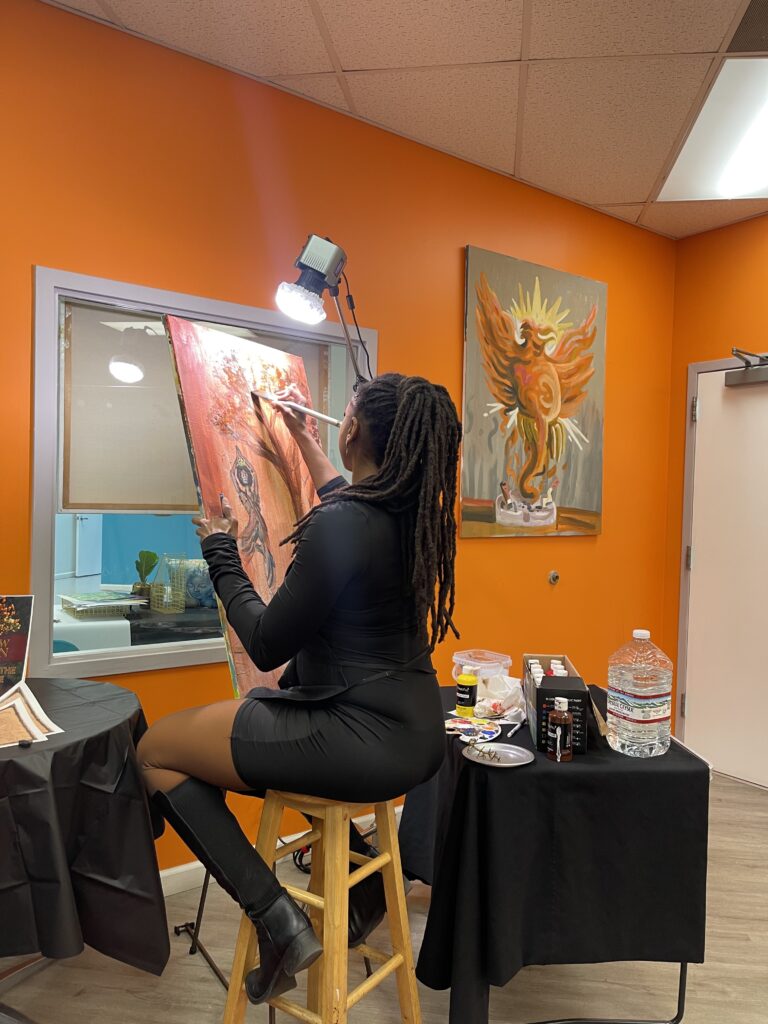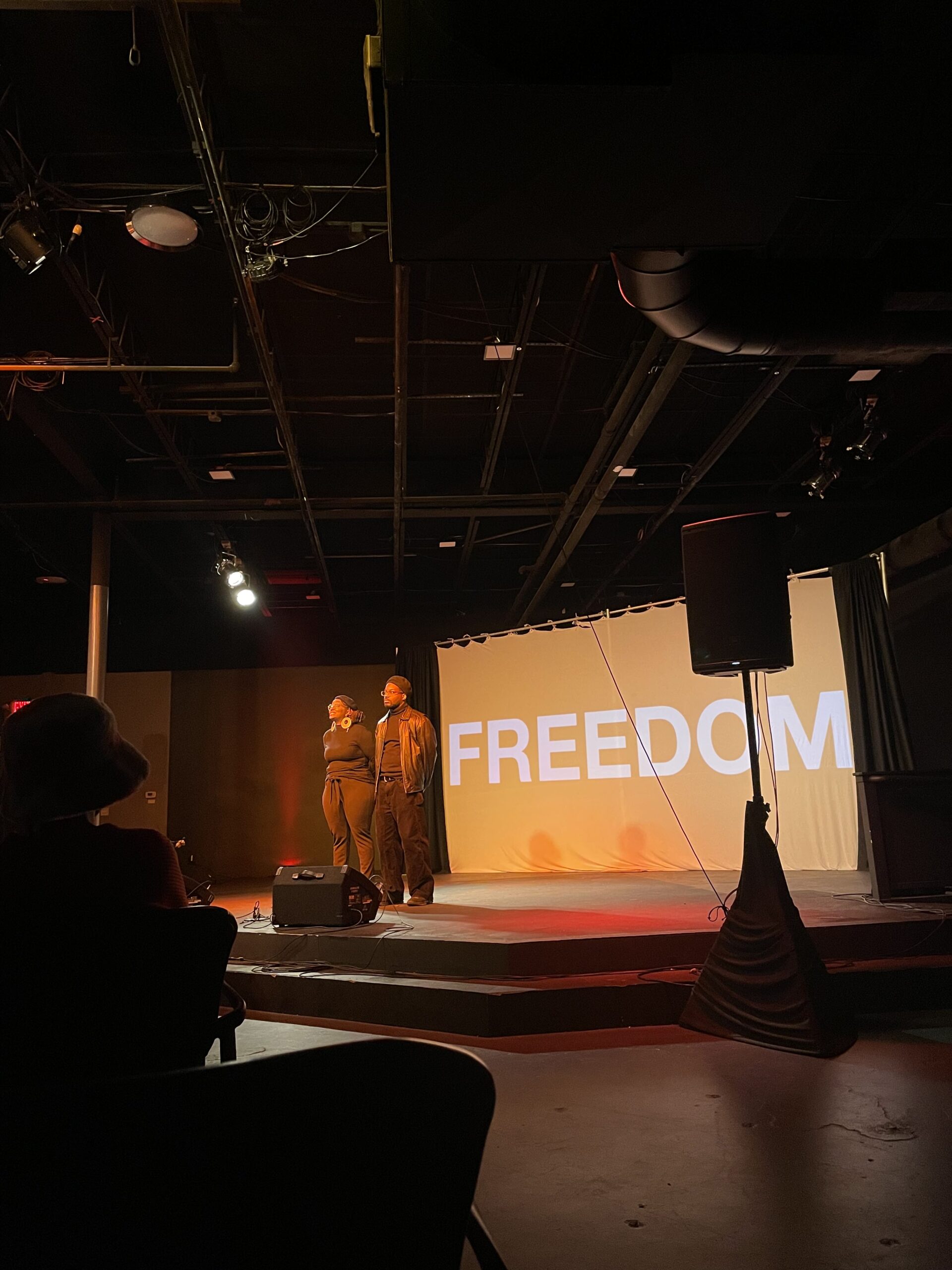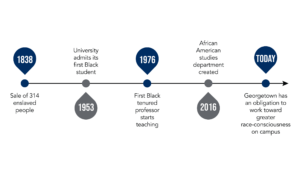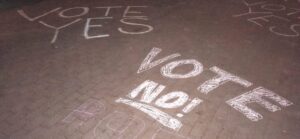In 2017, filmmaker Malachi E. Robinson took a DNA test that uncovered his connection to Mary Queen, a free woman of color brought to Maryland as an indentured servant and illegally forced into slavery in 1728. Queen’s descendents were among the at least 314 people who Jesuits running Georgetown University in 1838 sold to a Louisiana plantation. The sale is widely referred to as the GU272 due to an undercount of the number of people sold.
Inspired by his ancestor’s story, Robinson hosted the “Healing Justice Forum” at the Creative Suitland Arts Center in Suitland, Maryland on Jan. 25. The event included a panel discussion on Queen’s legacy, interviews, spoken word performances, and a screening of excerpts of Robinson’s historical documentary, “The Poppaw Queen.”
Mary Queen, also referred to as the “Poppaw Queen,” was a free woman of color who lived near the Popayán Province in South America. After she arrived in Maryland around 1715, she entered indentured servitude under merchant-planter James Carroll. Rather than letting her servitude end, Carroll illegally enslaved Queen and then her children and grandchildren. Queen and her descendants petitioned for their legacy in the courts of Maryland and Washington D.C. basing their case on the grounds Queen was born a free woman.
The film captures Queen’s haunting legacy, revealing the modern day resonance of this historic fight for freedom. Robinson recently won Best Documentary at the 2024 Prince George’s Film Festival in Maryland.
“The initial research about Mary Queen herself and the whole conversation around reparation resonated with me in a way that I wanted her story to be larger than just a film,” Robinson told the Voice.
The event brought together descendents of Africans and African Americans enslaved in Jesuit-owned plantations across Maryland. In attendance was Mélisande Short-Colomb (CAS ’21), who, at 63 years old, enrolled in Georgetown University in 2017 after learning that the Jesuits had sold her ancestors to pay off the university’s debts.
Short-Colomb wrote and produced the one-woman play, “Here I Am,” which chronicles the discovery of her ties to Georgetown and the legacy of the sale for the descendents. Her performance inspired Robinson to examine his connections to Queen through art.
“Mary Queen was resilient. She never stopped telling her story,” Robinson said. For the artist, storytelling became a path forward to his reconciling with slavery and continued structural racism in American society.
A vision of the film first came to Robinson in a meditation session in December 2022. He set aside the beginnings of a short film he had been working on and wrote out all four chapters of the new documentary from start to finish in one sitting.
Robinson was excited to debut excerpts of the film with the forum conversations.
“Film is just one way to inspire people to communicate,” Robinson said. “The idea of the forum was to stage this live and spark deeper conversations.”
The wide-ranging panel discussions reflected Robinson’s intention in incorporating perspectives of historians, authors, and activists. Moderated by tech professional and wellness practitioner Dr. Hassan Brown, the conversations moved from Robinson’s personal connection to Queen’s story to a dialogue on the meaning of healing justice and reparations with other descendants.
The conversations were interspersed with live spoken word performances by Rina Campbell and Austin Brown, also known as Pia-Anir the Poet and SoundCloud Poet, respectively. Standing in front of a semicircle of audience members, the pair took on Queen’s perspective in her fight for freedom through lawsuits––also known as Freedom Suits––and celebrated her courage despite plantation owners’ threat of retaliation.
“Even though the project is centered around Mary Queen, it is touching the entire Black community,” Brown said. “It was really just an exercise of tapping into all of the stories that come together in creating me and putting me in a position where I am today.”
The Creative Suitland Arts Center, where the event was hosted, served not only as the location of the forum, but was also the meeting place of many of the collaborators.
The panel discussions were accompanied by Tarika Campbell’s solo art exhibition “Love Endures: A Gold Representation” that distilled the theme of power and self-love in expressive portraits of Black women complete with gold details. Campbell also sat for a live painting during the forum.

Photo by Sharon Xie Tarika Campbell sits for a live painting of the forum on Saturday.Photo by Sharon Xie
“I wanted to pay homage to the Poppaw Queen, her being a powerful woman figure in our history,” Campbell said.
Brown also praised the community arts center for the close-knit group of creatives it cultivates. After connecting with Robinson at an open mic event hosted by the center, Brown was inspired to help Robinson make his artistic vision a reality.
The forum functioned not only as an opportunity to celebrate the story of Mary Queen, but a call to action too. Attendees left the event with a comprehensive film guide complete with discussion questions, educational content, artist profiles, and advocacy resources.
Robinson and Brown spoke to the pressing need to draw on the arts as a means of both defiance and strength.
“It is really important that we use our intrinsic gifts, in this case creative expression, as tools to resist and advocate,” Brown said. “We need artists to step out and use their voices because nobody else is right now.”







